
Understanding IRS CP40: What it means and How an Enrolled Agent Can Help
Understanding the IRS CP40 Notice
The IRS CP40 Notice is sent to taxpayers when their outstanding tax balance has been assigned to a third-party private debt collection agency. This means that the responsibility for collecting the debt now lies with a private agency authorized by the Internal Revenue Service. The purpose of this transfer is to take collection actions off the plate of IRS collections that are lower priority to the IRS before the collection statute of limitations for collections expire.
What It Means for Taxpayers
Receiving a CP40 Notice is no more serious than IRS collections actions. In fact, many of the tools available such as liens, levies and garnishments are not available to private collection agencies. It indicates that the IRS has cases that are higher priority for a variety of reasons, and the Service considers it more efficient to pass it on to the third-party collection company. The involvement of a private debt collection agency means that the taxpayer will now deal with an external party for payments and any related correspondence. This can sometimes feel intimidating. At Books, Taxes & More (BTM), we know how to deal with these agencies. We protect the rights of the taxpayer.
Options Available to Taxpayers After Receiving a CP40 Notice
Taxpayers have several options when dealing with a CP40 Notice.
· pay the outstanding balance in full to resolve the debt quickly.
· negotiate a payment plan or installment agreement with the collection agency.
· explore other IRS programs such as an Offer in Compromise, which allows settling the debt for less than the full amount under qualifying circumstances.
Importantly, taxpayers should verify the legitimacy of the collection agency and ensure that any payment arrangements are properly documented.
How an Enrolled Agent Can Assist
An Enrolled Agent (EA) is a federally licensed tax professional who can provide valuable assistance to taxpayers facing collection issues. In the context of a CP40 Notice, an Enrolled Agent can help by reviewing the taxpayer’s financial situation and advising on the best course of action. They can communicate directly with the IRS and the private collection agency on behalf of the taxpayer, helping to negotiate payment plans or other resolutions. Their expertise ensures that taxpayers understand their rights and obligations, while working towards a manageable resolution of the debt. Steve Perry, EA, has the experience education and passion to get the best possible outcome for our clients.
Taking Proactive Steps
Ignoring a CP40 Notice can lead to interest and penalties. The IRS can take a case back and engage in legal action against the taxpayer.
It is important to respond promptly with the guidance of Books, Taxes & More. Engaging BTM early will reduce stress and costs.
Conclusion
The IRS CP40 Notice signifies that a taxpayer’s unpaid balance has been sent to a private debt collection agency. Understanding the purpose of this notice and knowing the available options is crucial to effectively managing the situation. With the support of an experienced Enrolled Agent, taxpayers can navigate the process confidently and work towards resolving their tax debt in a way that fits their financial circumstances.
